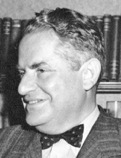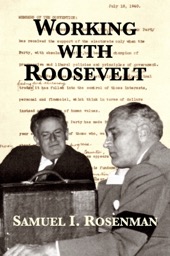
Running for Governor in 1928, FDR called on Rosenman to help him prepare speeches on State issues. Governor Roosevelt then appointed Rosenman his counsel and their close friendship and work association would continue unbroken for 17 years. Rosenman was FDR’s counsel in initiating reforms during his two terms as Governor of New York State and formed the Brain Trust that would bring these programs to the federal Government. At Rosenman’s request, FDR had appointed him to the New York State Court, lamenting that he was thereby “cutting off his right arm.” While serving on the bench, Rosenman nevertheless continued to lead FDR’s speechwriting teams during his four Presidential campaigns, helping draft speeches that shaped the policies of the New Deal — a term Rosenman coined — and prepared the country for war.
Rosenman served on the Executive Committee of the American Jewish Committee, which raised funds for relief and sought national unity as the response to antisemitism at home and abroad.
In 1940, Rosenman’s duties expanded to manage, as FDR’s unofficial counsel, the reorganization of wartime bureaus to promote efficiency, most notably in the areas of military supply and production, government housing, manpower management, and control of inflation. Working two full-time jobs and commuting between New York and Washington DC led to Rosenman’s hospitalization in 1943 and thereafter he had to choose just one career. He resigned from the state court to become the first Counsel to the President, a position specially created for Rosenman whose responsibilities would later include assessing conditions in Europe at war’s end (leading up to the Marshall Plan) and convincing the Allies to agree to the Nuremberg Nazi war trials.
In the midst of crises, FDR could relax with Rosenman who, with his wife Dorothy, were close friends with Franklin and Eleanor Roosevelt. After FDR’s death, Rosenman continued as White House Counsel to President Truman, transitioning New Deal programs to Truman’s “Fair Deal.” Later he was a New York City lawyer and President of the City Bar Association.
Working with Roosevelt is a memoir of Rosenman’s close association with FDR, detailing the process of crafting speeches and how the President operated. It includes revealing anecdotes and observations, especially with respect to FDR’s four Presidential campaigns. It is quoted frequently in histories of the New Deal and FDR’s war years, and is highly regarded as an uncommonly fair and objective memoir of service during America’s “rendezvous with destiny.”
Click on the cover for details about the eBook:




